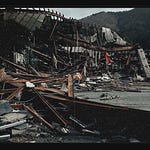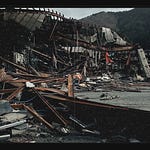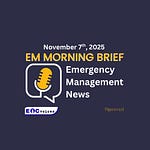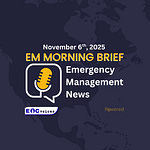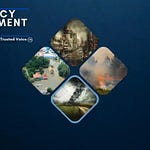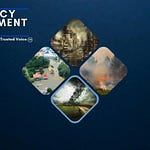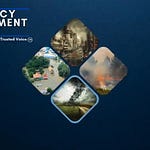0:14
Good morning, good morning, good afternoon.
0:15
How are you doing out there in the world?
0:18
And well, this is a revamp of prepare responder covers program we put on last two, oh, guess two years ago, right, We started with it.
0:29
I'm looking into all different aspects of what it is to respond to large scale emergencies and not just Emergency Management. Still, we're looking at law, fire, EMS, private industry, public side of things.
0:47
It's a broad brush.
0:49
And so I'm excited.
0:51
And so Todd and I, Todd Manzat is the 2 Todd's here.
0:55
Start talking about it, what it is and, and, and you know, he's got some really great insight.
1:01
I've known Todd for a while now.
1:04
And as you can tell here, the Blue Cell is the premier sponsor of this program.
1:08
And so I want to thank Todd for that.
1:10
And Todd, welcome.
1:11
Welcome to our show, I guess, for lack of better term.
1:14
Hey, well, thanks, thanks for the welcome.
1:16
And, you know, it was, it was kind of funny as we were kind of batting this around at the end of last year and, you know, here we are now getting ready to kind of jump right into it.
1:29
But certainly the world's events have helped us to have at least some stuff to talk about in the last 30 days.
1:38
It feels like it's April already.
1:40
And I know we'll get into a little bit of that.
1:42
But thanks for having me.
1:43
I'm glad to be part of it.
1:46
I think this is the longest January I've ever lived, Right?
1:53
Well, it's, you know, in some ways we're thinking back a little bit to, you know, what's going on.
1:58
I was in New Orleans this week and the events of New Year's Eve are in the distant past when they're worried about the Super Bowl.
2:06
They had a snowstorm and they had a a Sugar Bowl.
2:09
And it's, it's really interesting that the tempo right now is as real as it gets with regards to, you know, what we are going to be talking about here, you know, interested about that.
2:22
It's like, you know, obviously the, the events of January 1st with both New Orleans and Vegas, how quickly it came out of, out of the news cycle because you know, fires happened in, in, in California, you know, and that kept us hopping over here.
2:40
You know, obviously you guys all know that I live in, well, maybe not everybody, but I, I live in Southern California.
2:46
And so those fires directly impacted my area, not necessarily where I live, but close enough to where I have friends that lost homes and stuff in the fire.
2:57
So, I mean, and then then we got rain right after that, which is causing problems.
3:03
And then there's snow storms in in Louisiana in the South that's causing problems there.
3:07
And we're still not recovering from Hurricane Helene, You know, And then in the midst of all this, we get a new presidential administration, which is definitely moving fast, you know, And yeah, so are, are we going to be able to take your breath?
3:28
Well, you know, I don't know that we have a choice, right?
3:30
It's that kind of race.
3:32
And, you know, being as ready as we can be in different places, that's kind of part of it.
3:38
So that the folks who are sprinting as fast as they can can be relieved.
3:41
And one of the things that was interesting when I was in, in Louisiana this past week, they were talking about barring snow plows from another state.
3:49
Who, who does know how to do that, you know, pretty interestingly.
3:52
And then obviously, unfortunately, the events in DC with the, with the plane crash as the, you know, the most recent thing, another really, you know, significant type of event and response.
4:09
Just hearing, you know, some of the press conference stuff where they're talking about, you know, the things that, you know, I teach all the time, Unified command 300 responders out there.
4:21
Got to replace those responders.
4:23
Got a lot going on, got a lot of media, right.
4:26
All those aspects of something that makes any kind of response a little more complex.
4:34
Definitely it's going to be a a fun filled year of topics if we stay at this at this pace for sure.
4:44
Yeah, I want to talk about that plane crash here for forbid, not not about the plane crunch itself, but about how as a those of us in the field, you know, I know a whole bunch of people that are traveling at any given time.
5:01
I mean, you're one of them, a couple of friends down in Texas.
5:05
You have a friend of mine who carries Fronza, who's the president of IEM, who she was travelling during this time.
5:13
And I went to my, my, my click box of, oh, who do I need?
5:17
Who do I need to call to see if they're impacted by this?
5:20
And even if it's something as far away as DC, you know, and now you're going, oh, crap.
5:25
I mean, I called you or at least reached out to you to see if you know if you're travelling yet.
5:30
So you don't.
5:30
It's just this is amazing, like how small of a world we truly are when it comes to that.
5:36
And then I have friends that work and you do too, Todd, you know, that work in the capital that a part of Metro and and and DC fire and Fairfax fire.
5:46
And you know, you, you see this happening.
5:48
You're going, these are people who you know closely that are already impacted by this event, let alone the tragedy of the those lives that were lost, you know, in this tragic accident.
6:01
And I think that's part of the thing with what we do here between you and myself and, and the, and the organizations that, you know, we do touch every aspect of, of the United States and at some point global when it comes to Emergency Management, We're going to be able to bring those, that perspective to, to the this conversation.
6:24
Yeah.
6:24
I think the, the other thing that kind of jumped out at me was, you know, trying to think back through the history and, and certainly some of the legacy media folks were talking about the last time we had a crash and how long ago it was.
6:38
And in fact, I don't know if you picked up on it.
6:41
That last one was Buffalo and obviously Buffalo, NY.
6:46
You've got connections to that place, right?
6:48
Yeah, yeah, right.
6:52
And I'm headed to Binghamton, NY next Friday, which is not that far down the road.
6:57
So it's, you know, to bring it somewhat full circle, preparedness, response and recovery are interconnected.
7:05
All these disciplines are interconnected.
7:09
How we do things, we're trying to make them as interconnected, you know, as possible.
7:17
And I think it's going to be the right conversation, especially when we bring some doctrinal things in and and talking about some specific topics and then trying to overlay it to things that are really happening.
7:31
I think that's going to be one of the unique things about the conversation, hopefully, as we move the show forward.
7:38
Yeah, absolutely.
7:39
And I think the other thing too, Todd, that you know, you and I have some really deep conversations, you know, when it comes to the state of Emergency Management, the state of disaster response, you know, where where we need to go and how to get there.
7:57
And you know, the fact that we have a kind of book in this thing here, but we have progressive states that look at Emergency Management and disaster response and disaster preparedness and planning as holistic, right?
8:13
So that means like fire, police, EMS, public works, right, that we always forget, you know, public health, they're all involved in the conversation.
8:23
And then you have some States and somewhere areas that are myopic, right?
8:27
And they're very much silos on everything they they do.
8:30
I think some of the conversation that we're going to have here is hopefully to break down those silos and and be able to have those full conversations that we are all hazards approach to everything that we look at.
8:42
And I think that's critical, right?
8:45
And I think also in the, you know, our show concept, and I think it's important to share, you know, in this first episode, it won't just be me and you hanging out with each other.
8:55
I think our concept of bringing in guests as a, a third element to the show, a third voice, I think will be important.
9:04
I know you're working on lining up a few.
9:06
I'm working on lining up a few.
9:08
It'll be exciting.
9:09
And, you know, as we move into the coming weeks to get that guest line up out to folks and they can kind of hear a perspective and we'll definitely, you know, be leveraging our relationships.
9:21
I think to to bring in some strong, strong individuals to give a dynamic focus on, you know, what we're talking about.
9:31
And Speaking of relationships, I mean, you know, the other good part about this too is Todd, you and I both have some good relationships with some people that can bring really great insight.
9:43
And so we'll be leveraging those relationships as well to be able to bring you the audience some more insight to what what's happening in, in close to real time as possible.
9:53
And then of course, you know, my position with IEM allow some conversations to to happen as well.
10:01
And the Today as an example, well, we, we have to talk a little bit about the, the elephant in the room is what's going on with FEMA.
10:10
The, the president has set forth his vision on, on making changes.
10:16
And I don't think there's an emergency manager in the United States right now that doesn't think the Stafford Act needs to be, you know, looked at and, and fixed, right?
10:30
You know, it's an old act, right?
10:33
And that FEMA does need to have, you know, to be maybe remodeled a little bit.
10:38
Sure.
10:39
I, I definitely don't think it should be destroyed and taken away, But you know, where does it belong and, and, and how does it work?
10:47
And you know, I've been calling for a few years now.
10:49
Well, let's say probably over 10 years now that FEMA should be a stand alone agency.
10:53
And there's, there's cons and pros for both for, for all of this, right?
10:59
And then today I got to sit down with the acting administrator, Hamilton to hear a little bit about his background and what his, his, you know, his goals are.
11:11
And the good thing is, is what he's doing right now is listening to the emergency managers out there, meeting with the big groups such as IEM and Nima, big cities, meeting with them to discuss what their needs and goals and, and desires are when it comes to what FEMA is and can be.
11:34
And I think it's a really important first step.
11:37
And I, and I commend them for that.
11:40
Yeah.
11:40
You know, the, the, the basic rules and kind of organizational leadership are you, you got to, got to figure out what your objectives are, to figure out what your mission is, that type of thing.
11:51
And, and many times it's a driving factor in where you end up or who you're working for working under and, and how it's supposed to work.
12:00
I think, you know, that revisit it's, it's not something necessarily that, you know, every time you get a new leader in that you need to do that, But you also can't go 20 or 30 or 40 years and have problems and not do it.
12:16
And you know, there obviously is a, has been for some time a heartbeat out there saying, Hey, let's let's have it as a, a cabinet member.
12:27
And my position is whether it's a cabinet member or not, it's still going to come down to the mission, the organization, understanding what the mission is and the talent that's inside the organization.
12:40
I was in this little teeny organization for a short time called the United States Marine Corps.
12:45
It's a it's a branch under a department, but everybody knows who we are.
12:51
Everybody knows what we do because we've got a clear mission.
12:53
I've had it for 250 years and we're the best at what we do.
12:57
So in some ways, when you do it well, it doesn't matter that you're not equal to the Department of the Navy and under the Department of the Navy, just as an example.
13:09
And so I think that's going to be a hard, long conversation and a lot of work that'll have to be done to establish that capability that is not only understood but is respected and is effective in the field.
13:27
Because that's what's been coming into question is it's effectiveness in the field.
13:31
Where it sits organizationally probably doesn't have much to do with that.
13:35
So I think it'll be interesting moving forward.
13:39
I'm not watching from afar.
13:40
Certainly have a lot of folks that I'm talking to that are, they're nervous and they're trying to, you know, decipher what's happening and figure it out and where do I fit in?
13:51
In the end, you got to do the best job that you can and not have that question because you did the best job that could be done.
13:58
And so I I think that'll be something worth talking about moving forward and, and watching how it kind of transpires.
14:08
Yeah, absolutely.
14:09
And, and you're right, I think nervousness, I think is a good word to say.
14:13
Uncertainty, right?
14:14
It breeds nervousness a little bit.
14:15
And I think that's kind of where we're at.
14:17
And, you know, the current administration's communication style is, is interesting at the at the best or at the worst, I suppose, or whichever we look at it is sometimes I believe, you know, President Trump just floats things out there just to see how people react.
14:34
And, you know, he's a, he's interesting guy that way.
14:40
And I think it takes a little bit of time to get used to that style of communication.
14:45
Whether you agree with it or not.
14:46
It just says it is what it is, right?
14:48
You know, not just talking about the yeah, go ahead.
14:55
I was going to say that.
14:56
I was just going to judge.
15:01
We all have to get used to how Manhattan downtown developers do business.
15:08
That's, that's what we have to get used to.
15:10
And, and most of us haven't had to deal with that.
15:13
So it's a, it's a different way that things get done.
15:17
There's no question.
15:19
Yeah, absolutely.
15:20
And like I said, I'm not, I'm not judging it.
15:23
I'm not putting a value to it.
15:24
I'm just saying it is what it is.
15:25
And this is what we have to deal with.
15:26
You know, I, I think as emergency managers and, and, and guys that are in the field, you know, when we're looking at situations, we have to understand that we don't have time to placate on whether we agree with something or not.
15:43
We just have to deal with the consequences of what's happening.
15:45
And, and, and this is where we're at.
15:47
We have to deal with the consequences that, that, that are happening.
15:51
And so, you know, that being said, you know, what is the future of Emergency Management when it comes to to what the federal government believes in?
16:03
That's going to be a long conversation.
16:05
You know, you know, and we, we have a long history of things changing.
16:13
And I think we forget this because, you know, we we live in the generation that we're in, right?
16:20
And we may look back at the previous generations, but we live in where we're at and what we're used to and in that comfort zone.
16:28
And, you know, I think if we reflect back to when, you know, Franklin Donald Roosevelt created an office that would look at Emergency Management, if you will, without using the terminology.
16:39
It's where we grew up from, you know, to Truman turned it into really the civil defense of what we think of today, you know, with the Burt the Turtle and all that nuclear stuff that they were dealing with.
16:50
And and then it kind of got to Jimmy Carter at this point where he turned it into FEMA in 79.
16:56
And then, of course, the Stafford Act.
16:58
These are chunks that we didn't live in, right?
17:01
You know, some I, I, you know, realistically, Todd, you and I, we're from, you know, 70s into the, to the 80s when we were, you know, kids and then we're working.
17:12
The experience has been this short box.
17:14
So we look at these boxes that we've lived in and not understanding what the, what the history was and what the changes are.
17:20
So, so this too, you know, will be a little uncomfortable, but maybe it's uncomfortable that we need to be better.
17:28
And if we look at it that way and, and as long as we're part of the conversation, that's my only concern is if we start having conversation without us, then what does that mean?
17:38
Right, right.
17:40
And I think the, the other thing, just analyzing it a little bit as an outsider looking in, I think what are the alternatives going to be?
17:51
You know, they're, they're talking about a few alternatives and, and putting pressure or responsibility in other places, like for example, the states.
18:00
Well, they better do a true analysis of whether that capability is actually there.
18:07
It sounds great and it probably looks good on paper, but there's going to be a harsh reality that that may not be the answer.
18:17
And I'm, I'm not going to call out any one state or any 10 states or any 25 states.
18:22
I'm just going to say there will be serious questions as to whether certain states can take on those previous FEMA responsibilities.
18:33
And I think it could be a bigger mess and a bigger tragedy if that's not really looked at very, very hard and and very critically in terms of what the capabilities actually are in some of those locations.
18:51
You know, I think about the fires that we just had here in Los Angeles County and one of the last fires that kicked off as this thing was burning, you know, they were able to put 4000 firefighters onto a fire in in a very short period of time to stop it from burning up the town of Castaic or the village, I guess, right.
19:13
We got lucky in one aspect that there were already firefighters down here from all over the place that we can, we, we can move those assets over.
19:20
You know, that's one state.
19:23
State of California is unique in that aspect of it.
19:26
I mean, I don't think and, and I'm going to pick on a state and I mean, I can, you know, if, if you fear for that state, please let me, I'm telling you, I don't know the assets.
19:35
So I'm not not saying that you can't do it.
19:37
But if you took like Montana, for instance, who has lot of wild land fires, I don't know if they could put in in in 30 minutes of a fire kicking off, Could they put 4000 firefighters on that fire in 30 minutes of a kicking off?
19:52
Or Colorado for that matter, where you're from, you know, do they have those assets?
19:57
And, and maybe they do, maybe they don't, but that's the difference between having mutual aid and the federal government coming in to be able to pay for things on the back end than it is to to not right.
20:09
And and again, maybe Montana and Colorado could put those assets on their.
20:13
I'm not, I'm not trying to say that you're not on issues as an example, I want to be clear on that.
20:19
But you know, without federal assistance immediately, can the smaller states handle those large scale disasters as quickly as they can right now?
20:34
Sure.
20:34
I yeah, I definitely think that's, you know, that resource management piece is a is a big aspect of it.
20:40
But let's say you're a week into it, do some of the states have the ability to even manage that?
20:50
You know, when we start to think about some of the large scale operations and you know, maybe maybe you have an Emergency Management office, full time staff of 20 people that may not have, you know, the ability or the experience of handling, you know, that type of complexity.
21:11
That is the word that always bothers me.
21:16
The, the actual complexity.
21:18
You know, incident command speaks to it quite a bit.
21:21
We've got a pretty good system for incident command.
21:23
We've got a pretty good system at the top tier of who manages complex incidents and who's qualified to manage complex incidents.
21:32
Well, you know, some of that would somewhat come into question if you don't have that guidance from, from FEMA or even some of their support from an IMAP perspective.
21:42
And then we're that we're going to rely on a state agency of, of 16 people to, to be able to do it.
21:51
I don't know.
21:52
I I think it's definitely something that it's going to be a, a bridge we have to cross if that's the direction that we end up going.
22:00
Yeah, absolutely.
22:01
And, and, and going back to some of the smaller states.
22:03
And I'll pick on Maine here for a minute because I was talking, I was talking to one of the guys from Maine and they have volunteer emergency managers, you know, you know, and I'm like, well, and it blew my mind when we had this conversation with him.
22:22
I'm like, you know, I I never thought about that, that you have a town, you know, a state that's so, you know, sparsely populated in some areas that they just have some dude who's like, all right, I'll, I'll do it for a volunteer.
22:34
You know, like that means you get your regular day job that you're doing and in the evening, maybe you're, you know, you're doing Emergency Management stuff.
22:42
Yeah, that kind of that kind of blows my mind a little bit.
22:45
So, you know, what do we do with states like that that don't even have the ask the the ability to pay for emergency managers, you know, to live in what?
22:53
I mean, you know, how do we ask?
22:56
How do we?
22:56
And the support doesn't necessarily, you know, I want to rewind the minute, the support doesn't necessarily have to be be people on the ground, right?
23:05
You know, those volunteer emergency managers in Maine may have the the capabilities of doing it as on a volunteer basis because they don't have a lot of disasters that occurred.
23:13
That's fine.
23:13
I'm not, I'm not making fun of that position.
23:17
What I'm saying is they need support and the support that they might get might just be from training, you know, grants to help pay for things because obviously their tax base is going to be lower.
23:29
So they may need those, those grants from from the federal government to to pay for programs, you know, the send people to EMI or whatever they change their name to, you know, you know, for, for training, you know, the university.
23:50
Is that the university?
23:52
FEMA you or, or, you know, used to be FEMA you.
23:56
yeah.com.
23:58
Good Lord.
23:59
Something we're going to, we're going to send us hate mail.
24:02
Jeff Stearns, Doctor Stearns, We're not making fun of you, man.
24:05
We're just right.
24:12
Excuse me, but yeah.
24:14
I mean, we go into this like, how do we support those smaller states that don't have big budgets?
24:20
I'm lucky to be from living in California and from New York, which are, you know, have big budgets, but I mean, heck, even New York State, you know, I mean, if you want to take a look at the responders in New York State, there's the majority of the responders in New York State are volunteer.
24:41
You know, it's one of the states that there are more Volunteer Fire departments in New York State than paid, you know, So what does that look like?
24:50
And, and what support are they getting from, from the federal government, whether it's through FEMA, the National Forest Service, I help it out with, with different grants and stuff.
25:00
The you, you know, out here in, in the West Coast, we have BLM, which has firefighting assets and things that could be used.
25:09
There's a lot of stuff that National Forest Service.
25:12
There's a lot of stuff that we're relying upon and maybe even too much, right?
25:17
Maybe that's the back of our mind and and we're relying on those, those assets.
25:22
You don't compare it to saying let's pretend they don't exist, right?
25:26
I don't know.
25:28
That's the stuff I think is making a lot of people nervous about some of the changes that are going on right now of the unknown answers to unknown questions.
25:39
Yeah.
25:41
Well, it's going to be interesting.
25:42
It's going to be good.
25:43
And we'll kind of start to figure out right the next, next episode and who knows who's going to be in what jobs.
25:54
So we, we may, we may get a, a really good guess right as we, as we move forward or some of the folks who've previously been in those positions that give us some insight.
26:06
I think that's really our goal.
26:10
Absolutely.
26:11
Well, Todd, you know, we're trying to keep these within that 30 minute window and we're coming up to the last few minutes here on our conversation.
26:22
Is there anything that you'd like to say to the listeners out there that are coming back and, and how do we, you know, to the new listeners that might be just finding us?
26:32
I say, you know, TuneIn and we definitely will keep it interested and keep it moving from that perspective and, and give some feel reporting too.
26:41
That's one of the things I know that we've talked about that we want to incorporate here because I think it'll give a little bit different feel to to the conversation.
26:52
But I think this was a good one to get us started and look forward to talking to you next week.
27:00
Absolutely, my friend.
27:01
Looking forward to seeing you next week.
27:03
It's always, it's always nice to see that big smile right there very often.
27:09
Right.
27:09
Yeah.
27:11
All right, all right, everybody, until next time, you know, stay safe and well, stay hydrated.



